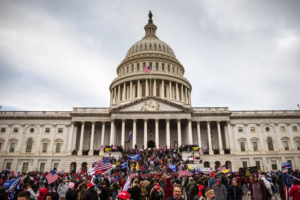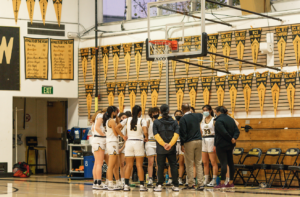
photo courtesy of Encyclopedia Britannica ImageQuest
Who do you think of when you imagine the people involved in the 2021 United States Capitol attack? A San Francisco web developer or a Bay Area yoga instructor probably were not the first people to come to mind. Living in a place as liberal as the Bay Area can make it easy to feel far removed from the far-right events of January 6. However, as of mid-January 2022, four Bay Area residents have been charged for involvement in the Capitol riot.
Author, political thinker and historian Rick Shenkman explained that “homogenization leads to significant breakaway movements. Whenever you have a large group, immediately what happens is smaller ‘splinter groups’ materialize. It is an illusion to think that just because in San Francisco the overwhelming majority of people are liberal, you’re not going to have dissenting voices.”
There will always be political outliers, even in the bluest part of California — after all, 56,000 San Franciscans voted for Trump in 2020. While Bay Area political diversity is marginal, it is by no means absent, and in the words of Shenkman, “Dissent is vital to democracy.”
However, there is a distinction to be made between valuable political dissent and harmful political extremism; people that voted Republican and people that chose to fly across the country to disrupt democratic processes are obviously very different.
Shenkman said, “There is a fairly clear line that you can draw, which is between people embracing violence and people rejecting violence. Violence is a marker of extremism — and so is one’s willingness to believe the absolute worst about the leaders of the country.”
But what causes people to get involved in violent extremism? And why is extremism so accessible today?
A 2021 study from the RAND Corporation concludes that the most significant factors causing people to join extremist groups is “victimization, stigmatization and marginalization.” In other words, people that feel socially isolated and angry at the world around them are more susceptible to radicalization.
Social media makes this radicalization process much more efficient and accessible than ever before. People lacking a sense of community in real life can easily hop online and find an extremist community there. The Capitol Attack is a particularly significant example of this: Robert A. Pape and Keven Ruby from The Atlantic report that 89% of Capitol rioters came from counties that Biden won, meaning it can be reasonably inferred that these people had their extremist ideologies validated elsewhere.
Clearly, the issues that caused the Capitol Attack are much deeper and more complicated than the isolated events of January 6, and the conditions that allowed this to happen are still present in the American political climate.
With the midterms coming up this year, questions arise surrounding the future of American elections and the lasting impact of the Capitol Attack. It seems doubtful that the D.C. Capitol will be stormed again, but the Capitol Attack may have shaped what’s considered “fair-game” in American elections.
However, the chances of similar political violence during the midterm elections are low due to the differing nature of midterm and presidential elections. Americans tend to be less invested in midterms, turnout rates are generally lower and the all-consuming energy of presidential elections is not usually as strong during midterms.
It also seems unlikely that the events of January 6 have deterred voters from the Republican Party. According to FiveThirtyEight, 44.5% of Americans say they would vote for a Republican over a Democrat in an election as of February 8, 2022 — 4.4% higher than six months ago and only slightly below the percentage of Americans that voted for Donald Trump in 2020.
Additionally, according to Kyle Kondik of the University of Virginia’s Center for Politics, Republicans are favored to gain control of the House during the upcoming midterm elections, showing that Republicans still hold more than significant political power despite the way the party has handled the Capitol Attack.
This is not to say that the Capitol Attack will have no impact on American elections and politics. University of California Law and Political Science professor Richard L. Hasen said, “The events of January 6, and more broadly the false claim that the 2020 election was stolen, are already impacting the 2022 elections.”
He further explained, “There are candidates running to be the chief election officers of their states who embrace the big lie.” That is, people that support the idea that the 2020 election was stolen.
“If you think the last election was stolen or say that you think that, you might be more willing to steal the next one,” Hasen said. In other words, there are people running for local election-related positions that support the 2021 attempts to overturn the 2020 elections, and Hasen argues that these people are more likely to jeopardize the integrity of the 2024 presidential elections.
Dustin Gardiner, who has been covering local, state and national politics with the San Francisco Chronicle for over two years, said, “Even though January 6th might not violently shake up the midterms, I think it really has changed our culture politically, in a sort of irreparable way.”
2021 was a year of remarkably restrictive voting policy; the Brennan Center for Justice reports that in 2021, at least 19 states passed 34 laws restricting access to voting, higher numbers than any previous year tracked by the Brennan Center.
Hasen said, “This all adds up to troubles for some people voting in 2022 and possible disputes over election results in 2024.”
It is uncertain what this means for 2024. Gardiner argues that violence similar to that which was observed in 2021 could return during the 2024 election. He said, “If Trump is the Republican nominee again, there will be a lot of concern about the potential for repeat violence.”
However, Hasen disagrees, and said that he is “far more worried that attempts at election subversion will result from those who run elections or counting votes potentially declaring the loser the winner This would be the end of American democracy as we know it.”
While national uproar of course impacts all aspects of the country, it appears that direct political violence is unlikely to occur in California.
Hasen said, “California elections seem not only to be run fairly, but for the most part, be insulated from some of the worst fighting in the voting wars. California is not one of the battleground states where the vote for President or other offices could be close. Those states are where we see some of the largest conflicts.”
Additionally, significant measures have been taken by the California state government to prevent political violence during elections. During the Capitol Attack, Governor Gavin Newsom called upon the National Guard without hesitation, and Ashley Zavala of Kron 4 News reports that the California State Capitol was “crawling with law enforcement.” Measures to improve the cybersecurity and physical security of the California state government have also been taken in the last year.
California appears to be safe from future attempts to overturn elections. However, California is by no means removed from the ideologies that contributed to the Capitol Attack which arguably threaten the nation as a whole — the actions of the four Bay Area residents charged for involvement in the riots. If there is one thing that everyone — researchers, rioters and everyone in between — can agree on, it is that the battle for American democracy is in full swing. While January 6 is a fight that has come and gone, this larger battle continues to evolve and develop as the nation nears its next major election.






